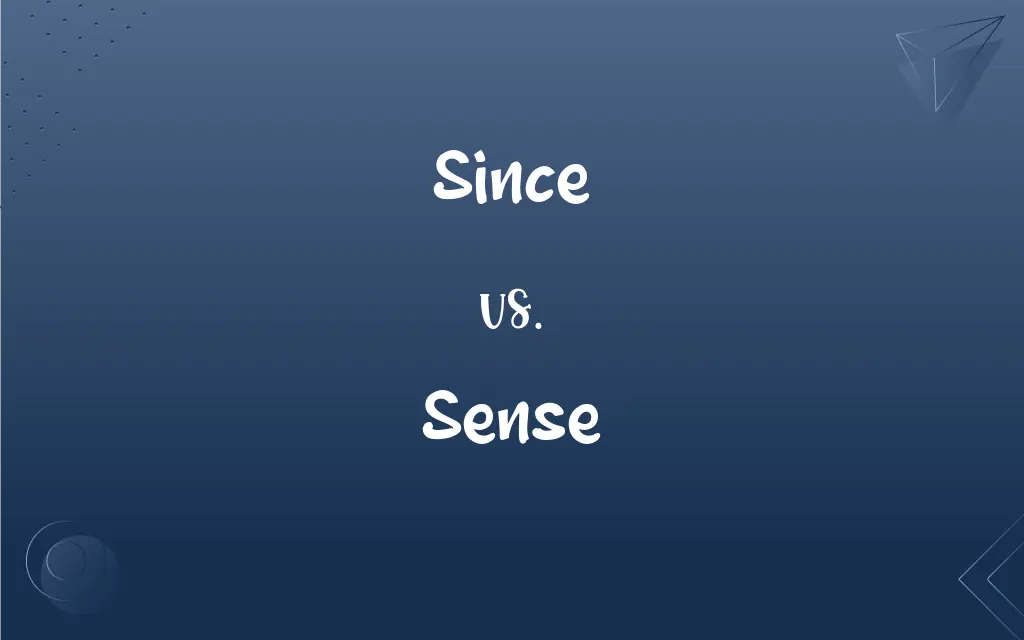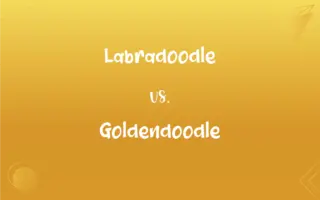Since vs. Sense: What's the Difference?
Edited by Aimie Carlson || By Harlon Moss || Updated on October 16, 2023
"Since" refers to time or causation, while "sense" relates to perception or meaning.

Key Differences
"Since" and "sense" are two English words that, though similar in spelling, diverge in meaning and usage. "Since" primarily indicates a time period starting from a specific point in the past and extending to the present, or it can imply causation. On the other hand, "sense" typically denotes a feeling, understanding, or one of the human faculties of perception.
When you hear "since," it's often in contexts reflecting time or reasoning. For instance, someone might say they've been waiting "since morning," or that they bought an umbrella "since it looked like rain." Conversely, the term "sense" might be used to describe a gut feeling or the human capacity to taste, touch, smell, see, or hear.
In sentences like "I haven't seen her since last week," the word "since" anchors the time frame. But in statements such as "I have a sense that he's hiding something," "sense" conveys intuition or perception. This distinction underscores how "since" revolves around temporal or causal concepts, whereas "sense" taps into cognition or awareness.
A myriad of phrases leverage the versatility of "since" and "sense." You might hear "since when have you been interested in astronomy?" or "make sense of this puzzle." While the former probes a starting point in time or challenges an assertion, the latter beckons comprehension or clarity.
It's essential to recognize the contexts in which "since" and "sense" are used to avoid confusion. Though they sound somewhat alike, their roles in sentences vary dramatically, with "since" hinting at duration or cause and "sense" invoking feeling or perception.
ADVERTISEMENT
Comparison Chart
Part of Speech
Preposition, conjunction, adverb
Noun, verb
Primary Meaning
Referring to time or causation
Perception, feeling, or understanding
Example Usage
"She has been here since morning."
"He has a keen sense of hearing."
Related to
Time duration or reason
Physical or mental faculties
Common Phrases
"Since when?", "It's been a while since..."
"In a sense", "make sense of", "sense of accomplishment"
ADVERTISEMENT
Since and Sense Definitions
Since
Referring to the time after a specified moment.
She's been away since Tuesday.
Sense
A feeling or intuition.
She had a sense that something was wrong.
Since
Used to indicate causation.
He took the day off since he was feeling ill.
Sense
A meaning or interpretation.
What's the sense of this poem?
Since
Introducing a reason or explanation.
I must apologize since I forgot to call.
Sense
Sound practical judgment.
Have some common sense before making a decision.
Since
Continuously from or counting from.
It's been years since we last met.
Sense
To perceive or be aware of something.
I sense danger ahead.
Since
Introducing a result.
He has been happier since retiring.
Sense
Any of the faculties by which humans perceive stimuli.
He has a strong sense of smell.
Since
From then until now or between then and now
They left town and haven't been here since.
Sense
Any of the faculties by which stimuli from outside or inside the body are received and felt, as the faculties of hearing, sight, smell, touch, taste, and equilibrium.
Since
Before now; ago
A name long since forgotten.
Sense
A perception or feeling produced by a stimulus; sensation
A sense of fatigue and hunger.
FAQs
Is "sense" only a noun?
No, it can also be a verb as in "sensing danger."
Does "since" always refer to time?
No, it can also imply causation or reason.
How is "sense" used in relation to human faculties?
It denotes faculties like sight, hearing, smell, taste, and touch.
Can "since" be used as an adverb?
Yes, as in "She hasn’t called since."
Can you use "since" with a future date?
Typically no, since it refers to past or present periods.
Can "sense" relate to comprehension?
Yes, as in "I don’t get the sense of this story."
Would "I've loved music since being a child" be correct?
Yes, it means from childhood to the present.
How can "sense" be used to indicate reasonability?
"Use your sense before acting."
Is "since" interchangeable with "because"?
Sometimes, especially when indicating a reason. But not always.
What is "sixth sense"?
It's an intuitive or extrasensory perception beyond the usual five senses.
Can "since" refer to the starting point of an action?
Yes, like "I’ve known him since 2010."
How is "sense" related to logic?
In phrases like "That makes no sense," it refers to logic or reasonableness.
How can "since" be used in a question?
"Since when do you like broccoli?"
Can "since" be used to mean "because"?
Yes, as in "Since you’re here, help me."
Can "sense" refer to a vague impression?
Yes, like "I have a sense he’s not telling the truth."
Can "sense" mean to detect?
Yes, like "sensing a change in the weather."
How would you use "since" to show causation?
"She stayed home since she was tired."
Can "sense" indicate a specific meaning?
Yes, as in "What’s the sense of this word?"
Is it correct to say "since long"?
It's more standard to say "for a long time" or "in a long time."
Is "sense" synonymous with "feeling"?
Often, yes, especially regarding intuitions or impressions.
About Author
Written by
Harlon MossHarlon is a seasoned quality moderator and accomplished content writer for Difference Wiki. An alumnus of the prestigious University of California, he earned his degree in Computer Science. Leveraging his academic background, Harlon brings a meticulous and informed perspective to his work, ensuring content accuracy and excellence.
Edited by
Aimie CarlsonAimie Carlson, holding a master's degree in English literature, is a fervent English language enthusiast. She lends her writing talents to Difference Wiki, a prominent website that specializes in comparisons, offering readers insightful analyses that both captivate and inform.































































